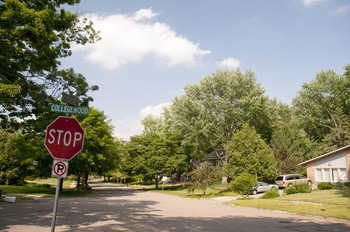Something stinks in Ypsilanti.
On June 17, Karla Yurgaites was watering plants outside her window at her College Heights home when she discovered a surprise.
A roughly 10-week-old skunk was sitting down in her 18-inch deep window well. She jumped back as the young skunk began to lift its tail.

Ypsilanti's College Heights neighborhood.
Tom Perkins | For AnnArbor.com
“I was just shocked when I found this little skunk stuck down there,” she said. “I didn’t know what to do.”
Believing that the animal might be stuck, she eventually crept back over and placed a board down to help it get out. But instead of climbing out, the skunk stayed in the well and was shaking and sneezing.
“I thought ‘That doesn’t seem right,’ ” Yurgaites said. So she called the Humane Society of Huron Valley to report what was happening.
A wildlife rescue officer came out, placed a blanket over the skunk, and used a specialized pole to trap it and place it in a cage.
After the officer left Yurgaites’ home, he stopped at a neighbor's house, where he picked up two more skunks reported to be behaving strangely.
The skunks are three of at least seven the HSHV has trapped in College Heights who are infected with distemper. The virus affects animals like skunks or squirrels, and it is fatal.
Because there is no cure, all the skunks that have been caught have been euthanized. Matt Schaecher, the HSHV's director of animal cruelty investigations and rescue services, said there is no way to stop the virus from spreading, and the outbreak of distemper will likely wipe out the skunk population in the College Heights area this summer.
“We generally find there’s one (animal) that catches it, and then it just starts wiping out a pocket of an area,” he said. “It’s not uncommon for us to get certain areas hit hard with distemper.”
Schaecher stressed that the virus is not transmittable to humans, but it is highly transmittable among animals - including dogs and cats - through saliva, urine or feces. It also is likely that another animal could catch it from a skunk's spray. Areas with the virus can be contaminated for several months and the virus can handle cold weather, Schaecher said.
The virus causes an animal to appear drunk. An infected skunk will lose its fear of humans, walk in circles, walk into trees and generally behave bizarrely.
“They really look like they’re drunk,” Schaecher said.
On the College Heights neighborhood Facebook page, neighbors reported skunks approaching their toddlers, being approached while gardening and seeing skunks walking around in circles.
Schaecher said the best defense for pets is to have them vaccinated. He strongly recommended against trying to catch or trap a skunk, and said a bite is cause for concern over the possibility of rabies.
“We do ask people that if they see a skunk not to try to catch it on their own,” he said. “If they get bit it poses a threat. If you’re bit you’re going to need the post rabies shot. What we would recommend is people contact the Humane Society immediately.”
He added that none of the skunks caught so far have tested positive for rabies.
Schaecher said there is no way of telling how many skunks live in the area, but College Heights is near wooded areas and skunks have a range of up to five miles from their dens. The neighborhood is bordered on the south by Washtenaw Avenue and Eastern Michigan University's property sits to the east and north.
So far no other Ypsilanti neighborhoods have reported strange skunk behavior.
Tom Perkins is a freelance reporter. Contact the AnnArbor.com news desk at news@annarbor.com.